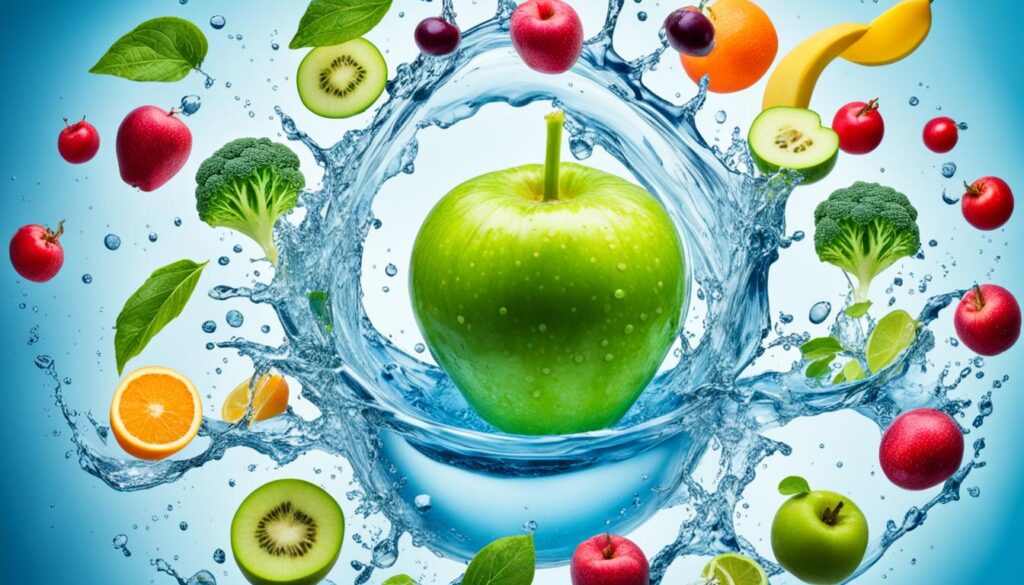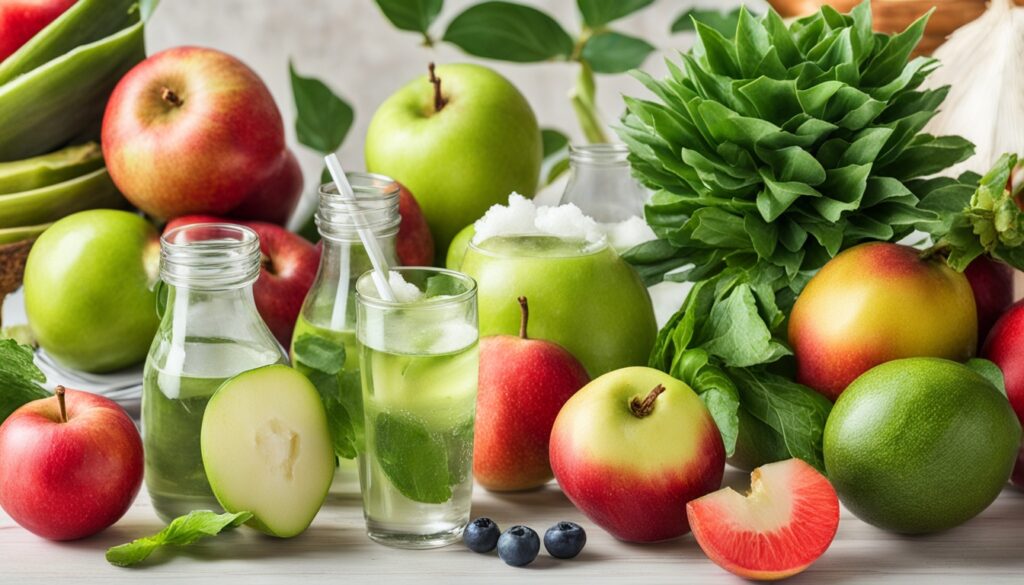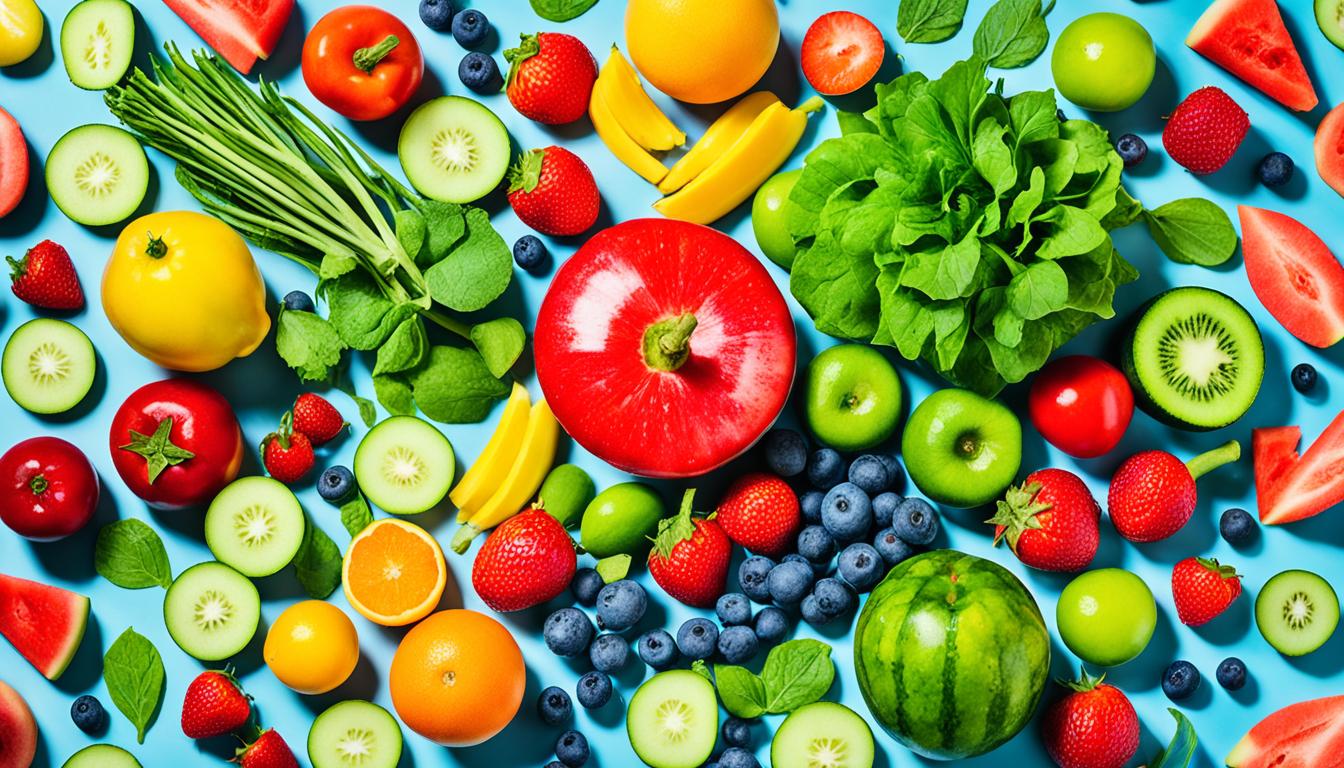Water apples, known for their exceptional hydration capabilities, are an underexploited superfruit that deserves attention. Despite their name, they neither grow in water nor resemble apples. These pear-shaped, glossy fruits are over 90% water, offering a crispy texture and a sweet, mildly tart flavor reminiscent of roses. Incorporating water apples into one’s diet provides a myriad of benefits due to their rich nutritional content, including hydration without the bulk of water intake. Water apples serve not only as a delightful treat but also work to hydrate the body, boost immunity, provide potent antioxidants, support digestive health, enhance heart health, and possess antimicrobial and antidiabetic properties.
Key Takeaways
- Water apples are over 90% water, making them an excellent hydrating fruit.
- With only 25 kcal per 100 grams, water apples fit well into any water apple diet plan.
- They contain vitamins like Vitamin A, B, and C, boosting immunity effectively.
- The high antioxidant content helps to combat oxidative stress and promotes cell health.
- Water apples are beneficial for heart health by lowering bad cholesterol and regulating blood pressure.
- They have antimicrobial and antidiabetic properties, supporting overall health.
- Regular consumption aids in weight loss by promoting proper digestion and preventing overeating.
What is a Water Apple?
The water apple, scientifically known as Syzygium samarangense, is a tropical fruit originating from Southeast Asia. Not only does it captivate with its bell-shaped appearance and refreshing taste, but it also offers a multitude of health benefits. Water apples are often praised for their role in promoting health and hydration, making them an excellent addition to any diet.
Introduction to Water Apple
Diverse cultures recognize the water apple under various names, enhancing its global popularity. It is known as Rose Apple, Bell Fruit, and Java Apple, reflecting its cultural integration across multiple regions. In India, where it holds a significant place, it is locally called Jambu and Safed Jamun. Is water apple good for health? Absolutely, its rich nutrient profile ensures it is both a delightful and beneficial fruit.
Different Names for Water Apple
The water apple goes by several names, illustrating its widespread acceptance and usage. In addition to Rose Apple, Bell Fruit, and Java Apple, different regions have adapted their terms based on linguistic and cultural interpretations. This multiplicity of names only serves to underline the versatile and universal appeal of the water apple.
Physical Characteristics
Water apples present a charming bell-shaped form, boasting a color spectrum that includes pale green and pink variations. Upon ripening, the fruit reveals a crunchy texture intertwined with a flavor that merges the crispness of a pear and the juiciness of watermelon. This unique combination not only makes the water apple a culinary delight but also an optimal choice for those eyeing weight management. Incorporating water apple in your diet is a great step towards weight loss due to its high water and fiber content, making it perfect for those aiming at including more nutritious, low-calorie foods.
The fruit’s nutritional profile further adds to its appeal, with a significant water content of 93%, aiding in improved hydration. Additionally, water apples contain antioxidants and essential nutrients that combat oxidative stress and enhance overall well-being. Hence, is water apple good for health? The answer is a resounding yes, supported by its rich and wholesome composition.
Nutritional Profile of Water Apple
The water apple is not only refreshing but also nutritionally dense, making it a great addition to a balanced diet. Its unique composition offers numerous health benefits, as highlighted below.
Vitamin and Mineral Content
Water apples are packed with essential vitamins and minerals. A 100g serving delivers:
- Vitamin C: 156mg, fulfilling 25% of the daily value, which aids in immune support and skin health.
- Vitamin A: 22mg, covering 5% of the recommended intake, contributing to vision and overall cellular function.
- Thiamine, Riboflavin, and Niacin: These B vitamins are present, supporting metabolic processes and energy production.
- Minerals: The fruit provides essential minerals like calcium (29.0mg), iron (0.1mg), magnesium (5.0mg), phosphorus (8.0mg), and potassium (123mg), which are crucial for various body functions from bone health to muscle function.
Caloric Value
Water apples are low in calories with only 25 kcal per 100g, making them an excellent choice for those looking to manage their weight. Additionally, they provide 0.6g of protein and have low amounts of total fat (0.3g), ensuring minimal calorie intake from fats.
Water Content
One of the standout features of water apples is their high water content—approximately 93g per 100g serving, constituting 90% of the fruit. This high level of hydration supports overall health and can be a vital component of water apple diet recipes.

The high-water content not only aids in keeping the body hydrated but also provides a sense of satiety, which can prevent overeating. With a glycemic load of just 2, water apples are suitable for individuals looking to manage their blood sugar levels, providing both water apple diet benefits and overall wellness support.
Health Benefits of the Water Apple Diet
The water apple diet offers numerous health benefits that make it an excellent addition to any dietary regimen. One standout feature is its remarkable hydrating ability, due to the fact that a 100g serving of water apple contains 90% water. This high water content is essential for keeping the body hydrated, which helps prevent conditions like dryness, dehydration, and fatigue.
Among the most noteworthy benefits of the water apple diet is its role in boosting immune functions. Packed with 156 mg of Vitamin C per 100g serving, water apples promote the production of white blood cells, thereby enhancing immunity levels in the body. Additionally, the presence of Vitamin A, with 22mg per 100g serving, contributes to protecting eye health and shielding against microbial infections.
For those keen on digestive health, the water apple diet tips its hat to the fruit’s high fiber content—1.5g per 100g serving. This dietary fiber assists in efficient digestion, ensuring regular bowel movements and preventing constipation. The fiber also aids in the proper absorption of nutrients, making the digestive system run smoothly.
Nutrition-wise, water apples are low in calories, containing only 5.7g of carbohydrates and 0.6g of protein per 100g, making them an ideal choice for a low-calorie, high-nutrient snack. These fruits are also enriched with potassium, providing 123mg per 100g, which helps relieve muscle tension and spasms. Antioxidants present in water apples further protect the body from harmful pollutants and toxic substances, reducing oxidative stress.
The benefits of the water apple diet extend to heart health as well. The fruit is known to be rich in niacin, which assists in managing cholesterol levels by increasing the production of good HDL cholesterol. Additionally, water apples have a low glycemic load of just 2, making them suitable for individuals managing diabetes.
Lastly, water apples have anti-inflammatory properties and contain bioactive compounds that exhibit antimicrobial effects. These properties support blood sugar management and potentially aid in brain and liver health. With so many compelling benefits, incorporating water apples into one’s diet can lead to a healthier and more balanced lifestyle.
Hydration and Water Apple
Water apples, recognized for their remarkable hydration properties, play a significant role in maintaining optimal body fluid balance. The incorporation of water apples into a diet plan is not only practical but also highly beneficial for overall health.
Hydration Benefits
Hydration is a key benefit of the water apple diet plan. With a high water content, water apples facilitate hydration throughout the day. Their slow release of water helps in balancing electrolytes and keeping the body satiated. Furthermore, water apples’ low glycemic index of 2 aids in reducing blood sugar levels, making them a suitable choice for a hydrating yet nutritious diet.

Comparison with Drinking Water
When comparing the benefits of consuming water apples with plain water, it is evident that water apples offer additional nutritional support. Unlike plain water, water apples provide essential nutrients like niacin for cholesterol management and rich antioxidants to protect the body from pollutants and toxins. This unique combination not only supports effective hydration but also contributes to sustained energy levels and overall wellness.
| Food Item | Water Content (%) |
|---|---|
| Water Apple | 93% |
| Watermelon | 92% |
| Strawberries | 91% |
| Skim Milk | 91% |
| Lettuce | 96% |
| Cucumber | 95% |
In conclusion, integrating water apples into your diet not only provides superior hydration benefits but also enriches the body with essential nutrients, making it a wise and health-conscious choice. For those pondering how to start a water apple diet, including these fruits daily can significantly enhance hydration and nutritional intake.
Water Apple for Weight Loss
Integrating water apples into your diet is a highly effective strategy for weight management. One of the significant aspects of the water apple is its impressive fiber content, which plays an essential role in promoting fullness and reducing the tendency to overeat. Eating water apples boosts fiber intake, contributing to feelings of satiety and aiding in digestive health.
Role of Fiber
Fiber in water apples not only aids in maintaining satiety but also helps in managing cholesterol levels. With about 4 grams of fiber per medium-sized apple, regular consumption can lead to a reduced calorie intake over time. The high water content further complements the fiber, making water apples an excellent option for anyone looking to lose weight without feeling deprived.
Low Calorie and High Nutrition
A water apple is a low-calorie food, containing approximately 25 kcal per 100 grams, but it is high in essential nutrients. This combination makes it incredibly advantageous for those on a weight-loss journey. A study conducted in 2008 highlighted that participants who consumed apples, compared to oat cookies, saw a decrease in overall calorie intake and achieved better weight loss results. Sustained over time, incorporating water apples into your diet can contribute to significant, healthy weight reduction.
Moreover, research shows that people who consumed apples regularly lost around 2 pounds over 10 weeks, showcasing the practical benefits of this fruit. The presence of antioxidants, vitamins, and minerals in water apples also supports overall health, ensuring one does not miss out on vital nutrients while aiming for weight loss. So, is water apple good for health? Absolutely.
“Consuming at least one apple per day has been linked to a significant reduction in the risk of certain cancers, such as mouth, throat, breast, ovarian, and colon cancer.”
Coupled with these benefits, water apples’ low glycemic index helps manage blood sugar levels, making them ideal for individuals looking to maintain or lose weight. Regular intake, combined with other healthy foods, makes the water apple an all-around contributor to a balanced diet and an effective tool for weight loss.
How to Start a Water Apple Diet
Embarking on a water apple diet is straightforward and can be incredibly rewarding. The first step is to incorporate water apples into various culinary creations, such as eating them fresh, adding them to juices, or including them in salads, jams, and pickles. Their sweet and tart flavor complements many dishes, making them a versatile addition to your diet. Eating the skin provides extra nutrients, but ensure you’re consuming organic varieties to avoid pesticide exposure. This fruit’s hydrating and antioxidant properties are just a few of the numerous water apple diet benefits you can enjoy.
Tips for Incorporating Water Apple into Your Diet
To fully leverage the benefits of a water apple diet, consider integrating this superfruit into your daily meals in creative ways. They can be an excellent snack on their own or add a delightful crunch and sweetness to fruit salads. For a refreshing drink, blend water apples into a smoothie or juice. The high water content of this fruit, which makes it a fantastic hydration source, can be especially beneficial during warmer months or intense physical activities. Experimenting with water apple diet recipes can turn this nutritious fruit into a staple in your kitchen.
Recommended Daily Intake
Dietitians recommend consuming 1-2 water apples daily for optimal hydration and nutrient intake. This moderate intake is enough to reap the essential health benefits of the water apple diet, such as improved cardiovascular health, effective weight loss, prevention of type 2 diabetes, and potentially increased longevity. It’s also advisable to consult healthcare providers before making any significant changes to your diet to tailor the recommendations to your specific health needs. By gradually incorporating this fruit into your meals, you can seamlessly transition into this beneficial diet.




